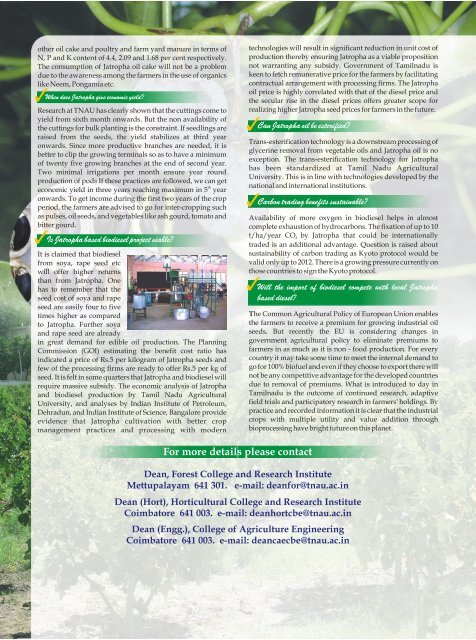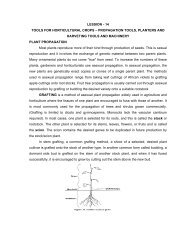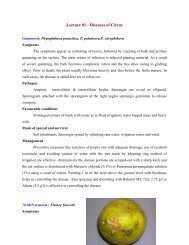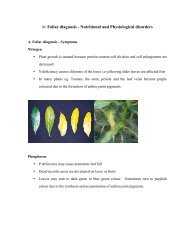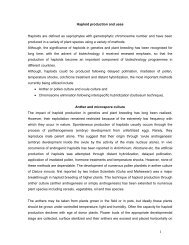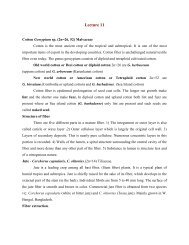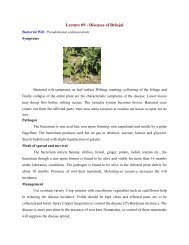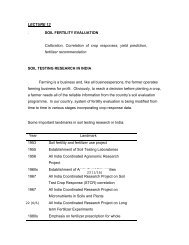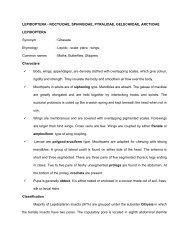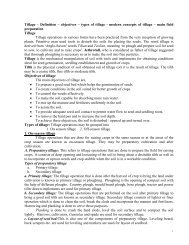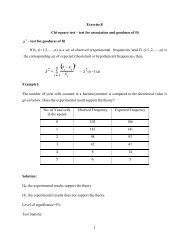Jatropha - Tamil Nadu Agricultural University
Jatropha - Tamil Nadu Agricultural University
Jatropha - Tamil Nadu Agricultural University
- No tags were found...
You also want an ePaper? Increase the reach of your titles
YUMPU automatically turns print PDFs into web optimized ePapers that Google loves.
other oil cake and poultry and farm yard manure in terms ofN, P and K content of 4.4, 2.09 and 1.68 per cent respectively.The consumption of <strong>Jatropha</strong> oil cake will not be a problemdue to the awareness among the farmers in the use of organicslike Neem, Pongamia etc.Research at TNAU has clearly shown that the cuttings come toyield from sixth month onwards. But the non availability ofthe cuttings for bulk planting is the constraint. If seedlings areraised from the seeds, the yield stabilizes at third yearonwards. Since more productive branches are needed, it isbetter to clip the growing terminals so as to have a minimumof twenty five growing branches at the end of second year.Two minimal irrigations per month ensure year roundproduction of pods If these practices are followed, we can gettheconomic yield in three years reaching maximum in 5 yearonwards. To get income during the first two years of the cropperiod, the farmers are advised to go for inter-cropping suchas pulses, oil seeds, and vegetables like ash gourd, tomato andbitter gourd.When does <strong>Jatropha</strong> give economic yield?Is <strong>Jatropha</strong> based biodiesel project viable?It is claimed that biodieselfrom soya, rape seed etcwill offer higher returnsthan from <strong>Jatropha</strong>. Onehas to remember that theseed cost of soya and rapeseed are easily four to fivetimes higher as comparedto <strong>Jatropha</strong>. Further soyaand rape seed are alreadyin great demand for edible oil production. The PlanningCommission (GOI) estimating the benefit cost ratio hasindicated a price of Rs.5 per kilogram of <strong>Jatropha</strong> seeds andfew of the processing firms are ready to offer Rs.5 per kg ofseed. It is felt in some quarters that <strong>Jatropha</strong> and biodiesel willrequire massive subsidy. The economic analysis of <strong>Jatropha</strong>and biodiesel production by <strong>Tamil</strong> <strong>Nadu</strong> <strong>Agricultural</strong><strong>University</strong>, and analyses by Indian Institute of Petroleum,Dehradun, and Indian Institute of Science, Bangalore provideevidence that <strong>Jatropha</strong> cultivation with better cropmanagement practices and processing with moderntechnologies will result in significant reduction in unit cost ofproduction thereby ensuring <strong>Jatropha</strong> as a viable propositionnot warranting any subsidy. Government of <strong>Tamil</strong>nadu iskeen to fetch remunerative price for the farmers by facilitatingcontractual arrangement with processing firms. The <strong>Jatropha</strong>oil price is highly correlated with that of the diesel price andthe secular rise in the diesel prices offers greater scope forrealizing higher <strong>Jatropha</strong> seed prices for farmers in the future.Can <strong>Jatropha</strong> oil be esterified?Trans-esterification technology is a downstream processing ofglycerine removal from vegetable oils and <strong>Jatropha</strong> oil is noexception. The trans-esterification technology for <strong>Jatropha</strong>has been standardized at <strong>Tamil</strong> <strong>Nadu</strong> <strong>Agricultural</strong><strong>University</strong>. This is in line with technologies developed by thenational and international institutions.Carbon trading benefits sustainable?Availability of more oxygen in biodiesel helps in almostcomplete exhaustion of hydrocarbons. The fixation of up to 10t/ha/year CO2by <strong>Jatropha</strong> that could be internationallytraded is an additional advantage. Question is raised aboutsustainability of carbon trading as Kyoto protocol would bevalid only up to 2012. There is a growing pressure currently onthose countries to sign the Kyoto protocol.Will the import of biodiesel compete with local <strong>Jatropha</strong>based diesel?The Common <strong>Agricultural</strong> Policy of European Union enablesthe farmers to receive a premium for growing industrial oilseeds. But recently the EU is considering changes ingovernment agricultural policy to eliminate premiums tofarmers in as much as it is non - food production. For everycountry it may take some time to meet the internal demand togo for 100% biofuel and even if they choose to export there willnot be any competitive advantage for the developed countriesdue to removal of premiums. What is introduced to day in<strong>Tamil</strong>nadu is the outcome of continued research, adaptivefield trials and participatory research in farmers' holdings. Bypractice and recorded information it is clear that the industrialcrops with multiple utility and value addition throughbioprocessing have bright future on this planet.For more details please contactDean, Forest College and Research InstituteMettupalayam 641 301. e-mail: deanfor@tnau.ac.inDean (Hort), Horticultural College and Research InstituteCoimbatore 641 003. e-mail: deanhortcbe@tnau.ac.inDean (Engg.), College of Agriculture EngineeringCoimbatore 641 003. e-mail: deancaecbe@tnau.ac.in


